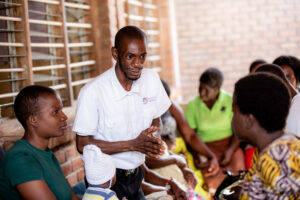FEATURE: International Father’s Day
Sunday 19th of June is International Father’s Day—a day that celebrates fatherhood and male parenting. As families gather to celebrate this special occasion, mothers2mothers (m2m) is paying tribute to male partners and fatherhood figures who are diligently supporting mothers and their children on their journey to a healthier, thriving life.
Across sub-Saharan Africa, women’s access to healthcare can often become challenging when gender dynamics see men put in charge of decision-making and basic and financial family resources, such as transport to visit the nearest health facility for lifesaving medical services.
UN Women reports that gender inequality remains one of the contributing factors to the spread of HIV and will continue to negatively impact the lives of women and children, unless men are proactively engaged in supporting their pregnant and newly delivered partners to prevent mother-to-child transmission of HIV.
In Malawi and Ghana, m2m is doing just that, by implementing integrated, family-centred programmes that not only cater to the health needs of pregnant and breastfeeding women, but also male partners.
“If a female client is living with HIV, or even if she is negative, Mentor Mothers will do a follow-up household visit to encourage the husband or partner to come for testing. Once a male partner knows his status, he can make more informed choices about his own well-being and that of his family,” explains m2m Malawi Programme Director—Tendai Mayani. “Male partners also attend our playgroup and parenting sessions where they learn about positive parenting, nutrition, and how to identify the key milestone indicators in their baby’s development. —a very proud achievement for the m2m Malawi team!”

An Expert Client engaging with clients during a parenting session at Ndirande Health Centre in Blantyre, Malawi
m2m Malawi is also the first country of operation to employ men as Community Health Workers—known as Expert Clients, who provide education and support to other men living with HIV. Steward Kapindula is employed as an Expert Client and reflects on his role and the impact m2m’s peer-based model has had on his community:
“Being an Expert Client for m2m Malawi is one of the best things that has happened to me. Living with HIV is not easy, but I use my own experiences to interact with other men to find workable solutions to their issues, all while still learning more about HIV and other health issues.”
“I have become a role model for other men in my community. I educate them about the importance of getting tested for HIV, and I often accompany newly diagnosed men to the health centre for antiretroviral treatment (ART) initiation. I also provide pre-ART counselling and trace clients who missed their ART appointment.
Listen to m2m Malawi Programme Director—Tendai Mayani, who shares more about the importance of including men in family health services:
Meanwhile, in Ghana, health challenges such as exposure to HIV, poor nutrition, and a lack of parental education are not uncommon, especially in under-resourced communities. Since launching in the West African stronghold two years ago, m2m has taken steps to educate male partners about the concept of responsive caregiving—which is one of the key Early Childhood Development (ECD) elements championed by the Global Nurturing Care Framework.
For 38-year-old Jefference Amano, who lives in Greater Accra region with his wife Gloria and two young children, the support and education he received from Mentor Mothers have helped empower him to better support his wife on her treatment journey. He recalls the night Gloria disclosed her status to him:
“I could see telling me [that she was HIV-positive] was not easy for her. She was very depressed and I just knew that I needed to encourage her to be strong. I didn’t know much about HIV but I did read that people living with HIV could lead normal lives.
“I took it upon myself to remind her constantly to take her medication and not to miss an upcoming appointment. If I did not know something, I would ask the Mentor Mothers…I just knew I had to support her no matter what.”
To ease the pressure on his wife, Jefference also took over more household responsibilities, such as cleaning and cooking duties, fetching water at the nearby water well, and bathing and taking care of the children.
“Often men in my community would ask me why am I fetching water. I know this is my family to protect, and I would explain that my wife is pregnant or unwell. These men would tell me that fetching water is a woman’s job. I think this kind of mentality, discrimination, and stigma towards women and someone living with HIV is still very prevalent in our community.”
Jefference is now sharing the knowledge he has gained through his interactions with the m2m Mentor Mothers with other male family members and friends. “I coach them on marriage and raising children. It isn’t always easy because not everyone is willing to talk about their families, but I try and share with them what I have learnt in the hope that they too can become better, more supportive partners and fathers.”






















